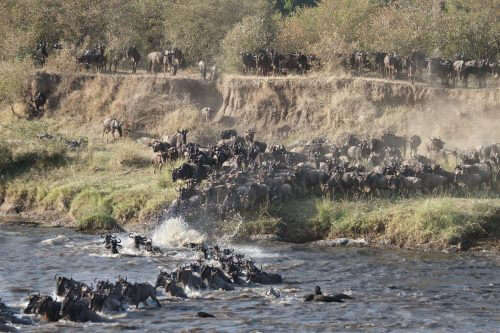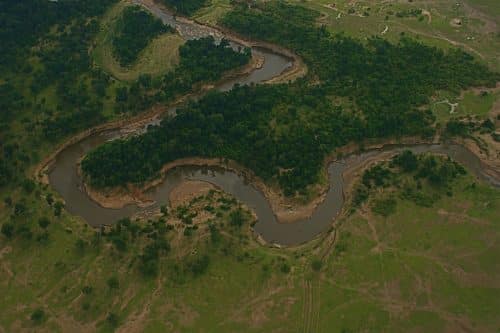In Kenya, they are preparing to build dams on the Mara River that will be used to generate electricity but also to divert water for irrigation. The river flows in flood after a rainy season but at the end of a dry season it becomes a trickle, therefore using its water for agriculture may cause it to dry up after dry seasons.

The Mara River is the main and only permanent source of water in southern Kenya and northern Tanzania. The river is not particularly long or large, yet it is one of the famous rivers among all nature lovers, since one of the natural spectacles that attract many travelers to its banks is the "crossing". The crossing of the river by hundreds of thousands of wildebeest (Gnu) and zebras is a special and beautiful event. The herds cross the river in their seasonal migration following the rain that grows pasture. The Serengeti and Masai Mara habitat is said to contain the largest concentration of ungulates in particular and mammals in general in the world.
So far everything is fine and dandy, but now a serious threat is emerging to the river and its natural environment, since in Kenya they are preparing to build dams on it, dams that will be used to generate electricity but also to divert water for irrigation. That is, less water will flow in the Mara River. The river flows in flood after a rainy season but at the end of a dry season it becomes a trickle, therefore using its water for agriculture may cause it to dry up after dry seasons.
In an attempt to sway the opinion of the environmentalists, they claim that: "The dams will divert water to reservoirs that will be used to flow into the river in dry seasons" - come on!
The Kenyan government has plans, some of which have been approved, to build dams on the Mara River and its tributaries, the river that drains the Mau Range, crosses the Maasai-Mara Reserve in Kenya, continues through the Serengeti in Tanzania and flows into Lake Victoria.
The person who is supposed to finance the dam project is the World Bank, but there is a claim that the bank's policy is wrong since the dam developers claimed that the Mera River is not international, a claim that is obviously incorrect and immoral (for example, the right to Nile water is supposed to be given to all the countries in the drainage basin).
Many environmentalists are worried about the initiative that will harm the two well-known and important reserves, and all the natural environmental systems that attract many tourists. Not only environmentalists are worried, the Tanzanian authorities are also opposed to the project for fear that it will harm tourism, which is an important source of income.
Tanzania therefore raised an objection to the project before the Organization of East African States (EAC). The organization has a legal right to express opposition and withdraw its support and deny the financing of the project, and thus possibly stop it.

It is worth remembering that about two years ago, Tanzania put forward a plan for a highway to Lake Victoria, a wide road that would cross the north of the Serengeti reserve from east to west. Under pressure from conservation bodies from all over the world, the route of the road was moved south outside the reserve, a route that extends the road by dozens of kilometers. Also based on this change, Tanzania claims the right to be a full partner in decisions concerning the "management" of the river that animates the northern Serengeti. According to the Tanzanians, if this right is not granted, all funding should be stopped.
At the same time, Tanzania is planning a dam on the river in the western region of the Serengeti. The dams in Kenya will make the Tanzanian dam redundant and turn it into an unnecessary and dry project. According to the plan, one of the dams will divert water to Lake Natron, the lake whose alkaline waters are famous as a nesting site for flamingos (junior). The discharge will change the composition of the water and cause the flamingo nests to flood. It is worth remembering that a project to expand a plant for the extraction of minerals from Lake Natron is being delayed due to the opposition of the environmentalists.
The Mau Ridge, which is the drainage basin of the Mera River, is already suffering from damage to the forests today, damage that causes climatic changes, less rain and more dry days. On top of that, hundreds of "piracy" pumps are added, so already today the flow in the river has decreased. As extreme as it sounds, dams can kill the river. One of the experts on the area says that the study for the realization of the project should read: "The Serengeti will die if Kenya closes the conversion".
Environmental conservation bodies as well as tourism agencies must mobilize to cancel the initiative, which may seriously damage one of the areas where nature is still preserved in all its glory, an injury that is not weighed against the economic benefit that Kenya may have, perhaps, since the Maasai Mara reserve in Kenya will also be damaged, a reserve that is a source of attraction for tourists that contribute to the country's economy.
The director of the Nature Conservation Authority in Tanzania says that: "The natural environment in the Serengeti will collapse and be destroyed in dry seasons without the ability to recover", since in dry seasons Kenya will be faced with the difficult choice: "to stop the flow of water to agriculture or to the river".
Those who join the call to stop the offensive projects are: ecologists and zoologists from the University of Perth (Australia), a group of directors and lobbyists in Kenya, the manager of the drainage basin of Lake Victoria (Lake Victoria Basin Commission) on behalf of the East African Union (EAC) and many more bodies and institutions that know and cherish the Serengeti …
In the past I wrote about dams their advantages and disadvantages:
This time there is no doubt that the disadvantages outweigh the advantages. Therefore it can be hoped that the objections will have their effect and the project will be cancelled.
